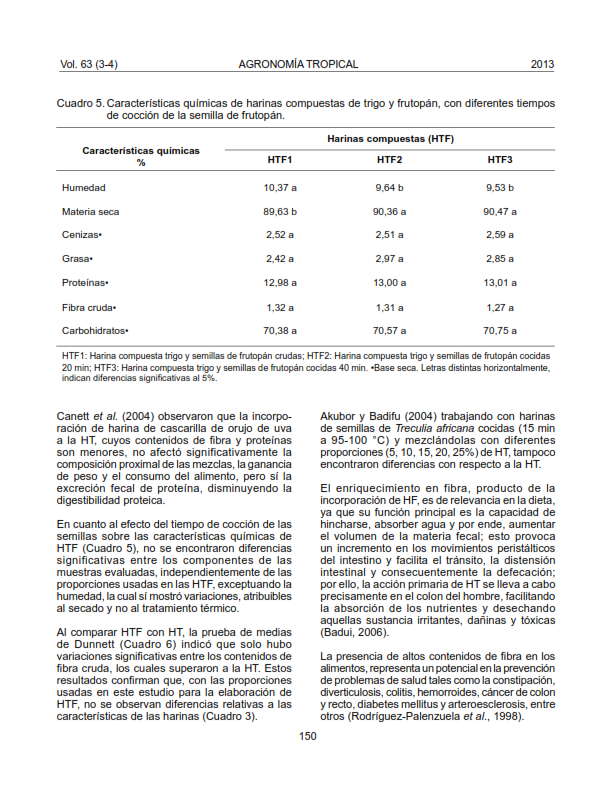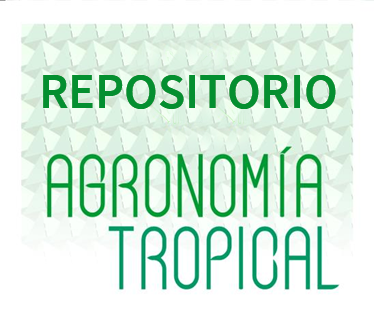Effect of various factors on chemicals characteristics of breadfruit flour and composed wheat – breadfruit flour
Abstract
Breadfruit seed (Artocarpus camansi White) has been recommended for its nutritional value; however, it is rarely used in Venezuela as food. The aim of this study was to evaluate the effect of the month of harvest and cooking time of breadfruit seeds on chemical characteristics of flour (HF) as well as the proportion of flour used and cooking times of seeds in the preparation of wheat and breadfruit composed flour (HTF). Fruits were harvested in two different months in the locality of Cumboto, Aragua state, Venezuela. The HF was obtained by grinding seeds treated with and without cooking for 20 and 40 min and dried at 45 °C. The HTF was prepared by incorporating 15, 25 and 35% HF to wheat flour (HT). Moisture, dry matter, ash, fat, protein, crude fiber, and carbohydrates contents were determined. A factorial variance analysis 3x2 was applied to data obtained. Factors evaluated were cooking time (three levels), harvest month (two levels) and proportion of flour (three levels). The characteristics of the HF vary with cooking time and month of harvest, while HTF was unaffected by cooking or by HF proportion. Factors evaluated only influenced HF. In addition, the results revealed that in the preparation of the HTF the incorporation of 35% HF from seeds cooked for 20 min is feasible.
Downloads
References
• Adeleke R. and O. Abiodun. 2010. Nutritional composition of breadnut seeds (Artocarpus camansi). African J. Agric. Research. 5(11):1.273-1.276.
• Akubor P. 2005. Evaluation of physic-chemical and sensory qualities of African breadfruit and sewed potato based supplementary foods. J. Food Sci. Technol. 42(4):292-296.
• Akubor P. and G. Badifu. 2004. Chemical composition, functional properties and baking potential of African breadfruit kernel and wheat flour blends. J. Food Sci. Technol. 39:223-229.
• Association of the Analytical Chemists (AOAC). 1997. Official Methods of Analysis. 16th Edition. Gaithersburg, Maryland. USA. 1995 p.
• Badui S. 2006. Química de Alimentos. Cuarta Edición. Pearson Educación. México. 715 p.
• Bahado-Singh P., A. Wheatley, M. Ahmad, E.Morrison and H. Asemota. 2006. Food processing methods influence the glycaemic indexes of some commonly eaten West Indian carbohydrate-rich foods. Bristish J. Nutr. 96:476-481.
• Benítez B., A. Archile, L. Rangel, K. Ferrer, Y. Barboza y E. Márquez. 2008. Composición proximal, evaluación microbiológica y sensorial de una galleta formulada a base de harina de yuca y plasma de bovino. Arch. Latinoamer. Nutr. 33(1):111-116.
• Canett R., A. Ledesma, I. Robles, M. Sánchez, R. Morales, L. León y R. León-Gálvez. 2004. Caracterización de galletas elaboradas con cascarilla de orujo de uva. Arch. Latinoamer. Nutr. 54(1):93-99.
• Casanova E. 1996. Introducción a la ciencia del suelo. Universidad Central de Venezuela. Caracas, Venezuela. LITOPAR. 379 p.
• Comisión Venezolana de Normas Industriales (COVENIN). 2001. Norma Venezolana N° 217-2001. Harina de trigo. Ministerio de Fomento. 9 p.
• Fasasi O., A. Eleyinmi and M. Oyarekua. 2007. Effect of some traditional processing operations on the functional properties of African breadfruit seed (Treculia africana) flour. LWT. J. Food Sci. Technol. 40:513-519.
• Herrera J. y J. Rico. 2008. Aprovechamiento artesanal de las semillas de frutopán (Artocarpus altilis) Park. Fosb., en la elaboración de tortas y galletas. Trabajo de Grado. Maracay, Ven. Universidad Central de Venezuela. Facultad de Agronomía. 52 p.
• Kirk W. and N. Badrie. 2005. Nutritional composition and sensory acceptance of boiled breadnut (Artocarpus camansi Blanco) seeds. J. Food Technol. 3(4):546-551.
• Mansilla G. 2006. índice glucémico de los alimentos. Disponible en línea: https://bit.ly/38Xv6Qc [Jul. 02, 2008].
• Mendoza J. 1992. Caracterización física y química de la harina del fruto “Ñane de palo” (Artocarpus altilis) en dos grados de madurez y su uso en la elaboración de galletas. Trabajo de grado. Maracay, Ven. Universidad Central de Venezuela. Facultad de Agronomía.
• Monagas O. 1995. Estudio socio-económico y agronómico de los productores y las parcelas agrícolas de la población de Cumboto. Estado Aragua. Trabajo de grado. Maracay, Ven. Universidad Central de Venezuela. Facultad de Agronomía. 64 p.
• Nuñez J., L. Ortiz de Bertorelli, L. Graziani de Fariñas, A. Ramírez y A. Trujillo. 2011. Caracterización del fruto y semilla de frutopán ( Artocarpus camansi Blanco). Bioagro. 23(1):51-56.
• Ramírez A., L. Ortiz de Bertorelli, S. Irigoyen, Y. Caraballo y L. Graziani de Fariñas. 2012a. Factores antinutricionales y propiedades funcionales de la harina de la semilla de frutopán (Artocarpus camansi Blanco). Rev. Fac. Agron. (UCV). 38(1):25-31.
• Ramírez A., L. Ortiz de Bertorelli, L. Hidalgo y L. Graziani de Fariñas. 2012b. Elaboración de una pasta alimenticia usando harina compuesta trigo y frutopán (Artocarpus camansi Blanco). Rev. Fac. Agron. (UCV) 38(1):18-24.
• Rangel R. 2001. Fisiología del desarrollo de las plantas monocárpicas y sus mecanismos de regulación. Universidad Central de Venezuela. Maracay, Venezuela. Librería Fagro 128 p.
• Rodríguez-Palenzuela P., J. García y C. Blas. 1998. Fibra soluble y su implicación en nutrición animal: enzimas y probióticos. Dialnet pp. 227-240. Disponible en línea: https://bit.ly/2Wksucw [Jun. 07, 2008].
• Statistical Analysis Systems (SAS). 1998. SAS/ STAT User’s Guide. Relase 6.132 edition. SAS Institute Inc. Cary, NC., USA. 1028 p.





